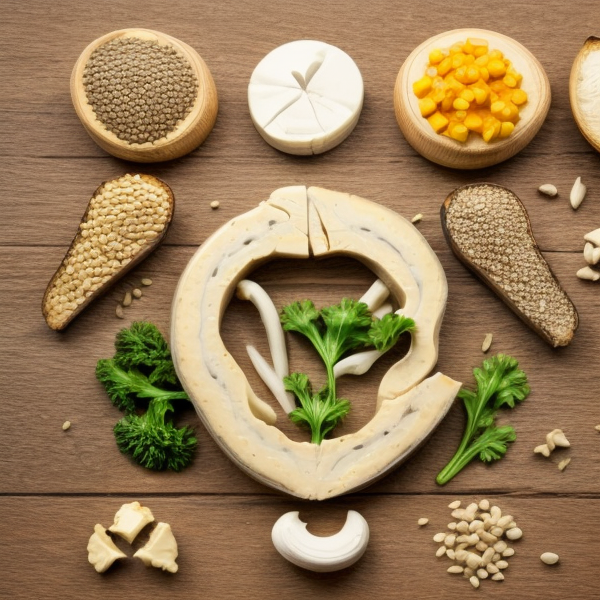Calcium-Rich Foods for Vegans and Vegetarians

Title: Calcium-Rich Foods for Vegans and Vegetarians
Introduction:
As a vegan or vegetarian, you may be concerned about getting enough calcium in your diet. Calcium is essential for strong bones and teeth, as well as maintaining healthy muscles, nerves, and blood vessels. However, many common non-dairy sources of calcium exist that can easily be incorporated into a plant-based diet. In this article, we’ll explore some of the best options for ensuring you get enough calcium while following a vegan or vegetarian lifestyle.
1. Tofu, Edamame, and Tempeh:
These soy products are not only high in protein but also contain significant amounts of calcium. One half-cup serving of firm tofu contains approximately 200 milligrams of calcium, while a half-cup of cooked edamame provides around 98 milligrams. Additionally, tempeh, which is made from fermented soybeans, offers about 200 milligrams of calcium per cup.
2. Leafy Greens:
Collard greens, kale, turnip greens, mustard greens, and bok choy are all excellent sources of calcium. A one-cup serving of these leafy green vegetables typically provides between 150 and 300 milligrams of calcium. To maximize absorption, it’s recommended to consume these greens with a source of vitamin D, such as fortified plant milk or sunlight exposure.
3. Fortified Plant Milks:
Many plant-based milks, including almond, soy, rice, and oat, are fortified with calcium. A one-cup serving of fortified unsweetened almond milk typically contains around 450 milligrams of calcium, while a cup of fortified soy milk provides about 300 milligrams. Be sure to check the nutrition label on your preferred brand to ensure adequate calcium content.
4. Nuts and Seeds:
Although they don’t provide as much calcium as other foods on this list, certain nuts and seeds are still valuable sources. One ounce of almonds, for example, contains about 75 milligrams of calcium, while sesame seeds offer approximately 100 milligrams per quarter-cup serving. Try adding these to your salads, smoothies, or snack mixes for an extra boost.
5. Calcium-Set Tofu:
This type of tofu has been specially prepared with calcium sulfate, which helps increase its calcium content. A half-cup serving of calcium-set tofu can provide up to 300 milligrams of calcium. It can be used interchangeably with regular tofu in recipes and makes a great addition to stir-fries, curries, and soups.
6. Calcium-Rich Fruits and Juices:
Some fruits and fruit juices are surprisingly rich in calcium. For instance, one large orange provides about 75 milligrams of calcium, while a cup of dried figs offers over 200 milligrams. Other good sources include blackberries, raspberries, and grapefruit juice.
7. Tahini and Sesame Butter:
Tahini, which is made from ground sesame seeds, and sesame butter, which is made by grinding roasted sesame seeds into a paste, both contain significant amounts of calcium. Two tablespoons of tahini provide around 100 milligrams of calcium, while two tablespoons of sesame butter offer approximately 80 milligrams. Use them as a dip, spread, or ingredient in sauces and dressings.
8. Fortified Cereals and Breakfast Bars:
Many breakfast cereals and bars are fortified with calcium, making them a convenient way to start your day off right. Check the nutrition label to ensure that the product you choose provides at least 10% of your daily value (DV) of calcium per serving. Some good options include fortified granola, whole-grain cereal, and breakfast bars.
Conclusion:
By incorporating these calcium-rich foods into your vegan or vegetarian diet, you can easily meet your daily needs for this essential mineral. Remember to also consume plenty of vitamin D, either through sun exposure or fortified foods, to aid in calcium absorption. With careful planning and mindful eating, you can enjoy a balanced and healthy plant-based lifestyle.
